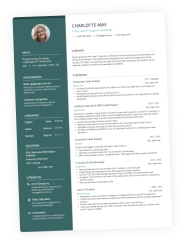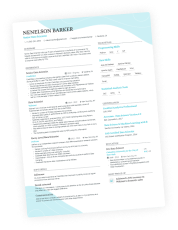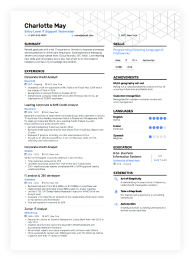Showcasing the right skills is crucial for a strong CV. They let recruiters and hiring managers know you can do the job.
You can have years of experience and a stack of degrees, but when it comes down to it, skills are how you get the job done.
The right candidate needs to know how to use the software, write the programming language, lead teams, or whatever industry-specific skills are necessary for the role.
We will take you through some of the key skills recruiters look for on a CV and help get you one step closer to an interview.
Explore our large collection of CV examples and see what skills are popular in your industry.
Is your resume good enough?
Drop your CV here or choose a file. PDF & DOCX only. Max 2MB file size.
Identifying the most relevant skills for your CV
The first step in identifying key skills for your CV is looking at hard skills vs soft skills. While the specific skills vary by industry and role, every job requires some combination of the two.
Hard skills refer to the knowledge required for job-specific tasks and operations. Soft skills have more to do with personal qualities and your ability to work with others.
You likely have more skills than will fit on your CV. It’s important to determine the right ones to include.
Your CV should always focus on your skills and experience most relevant to your target job. Recruiters have limited time and you have limited space to work with.
Don’t crowd your CV with unnecessary and irrelevant information. It will just overwhelm recruiters and won’t get you any closer to a job offer.
The best way to identify the right skills to include is by studying the job description of your target job. Research the company and industry trends as well.
What skills does the role require? What skills are in high demand in the industry?
The overlap of your strengths and what the job requires will be your key skills.
If you’re making a career change or have recently graduated from school, your industry-specific skills may be lacking a little. In this case, focus on transferable skills.
Let’s take a deeper look into key skills for your CV categorized by industry. Then when you’re ready, head over to our CV builder to start creating yours!
Hard skills - 42 industry-specific examples for a great CV
Technical and software skills
Tech jobs continue to be some of the most sought-after positions in today’s technological world.
However, just because they’re in high demand doesn’t mean they’re easy to get.
The technology sector is constantly evolving and advancing. It’s easy to fall out of touch with current trends.
We’ve compiled some of the top technical and software skills for your CV in 2025.
Programming languages and coding skills
Web development and software maintenance wouldn’t be possible without the right coding skills. If you want a long career in writing computer programs, you have to keep your skills current.
Whether your wheelhouse is frontend or backend, knowing what programming languages to use is crucial to success. JavaScript may still be king when it comes to development, but learning additional languages will give you an advantage.
For data management, having expertise in Python is key. SQL and R are a close second.
C++ and Scala are good languages to know for candidates seeking positions in cloud computing.
As with any job, the best approach is to research the company and learn what coding skills they value the most. Find out what programming languages they use and which are the most popular in your niche.
Here is a list of the top programming languages to consider adding to your CV.
Top 15 programming languages and coding skills for 2025
-Python
-C++
-SQL
-R
-Rust
-HTML
-CSS
-Golang
-AWS
-Linux
-Network protocols
-Cloud Architecture
-ML algorithm and libraries
-Applying AI and ML to data-driven models
-Unix tools
Design and creative software skills
The technical world of art and design is just as expansive and dynamic as web development. In order to stay ahead of the competition, you’ve got to remain up to date on the latest software and technical skills.
Graphic designers, animators, and illustrators typically utilise design software more than coding languages. Specific applications vary based on the role.
Adobe Creative Suite continues to be the top choice for the industry.
However, there are plenty of other applications that are useful on a CV. Especially for niche markets looking for very specific software skills.
Take a look at some of the top design and creative software skills for your CV.
Top 15 design and creative software skills for 2025
-Adobe Photoshop
-Adobe Illustrator
-Adobe InDesign
-Canva
-Affinity Designer
-CorelDRAW
-Corel PaintShop Pro
-Sketch
-Lunacy
-Procreate
-Gravit Designer Pro
-Inkscape
-Xara Designer Pro X
-UX/UI Design
-Interactive media
Office and productivity tool skills
Office tools are crucial for most jobs, not just the tech sector. Any role that requires the use of a computer, the handling of documents, or virtual communication is going to utilise office software.
Today there are a lot of applications designed to make office work smoother. Keeping tasks and communication organised is key to productivity.
Companies won’t always require expertise in a specific productivity tool, but it’s a good idea to know what software is popular in your field.
Pro Tip
In some cases, it’s better to NOT include basic tools like Microsoft Office on your CV. It has become the standard in many industries and candidates are expected to know it. Use your discretion and only put basic office tools on your CV if the job description lists them as a requirement.
Let’s look at a list of some of the most popular office and productivity tools for a CV.
Top 12 office and productivity tools for 2025
-Microsoft Office
-Google Workspace
-Asana
-Slack
-Trello
-Microsoft Teams
-DocuSign
-Grammarly
-Zapier
-Airtable
-Doodle
-LibreOffice
Certifications and licences - 10 industry-specific examples for your CV
Professional certifications
An official certification can be a great way to show proof of expertise in a particular skill. This is especially helpful if your work experience is lacking when it comes to the job requirements.
Anyone can list a skill on their CV, but professional certification is evidence of the time and effort you put into it.
The best certifications and licences for a CV vary greatly by industry, but here are a few of the best industry-specific certifications to consider.
10 certifications to put on your CV in 2025
- Certified Associate in Project Management (CAPM)
- Project Management Professional (PMP)
- Certified Business Analysis Professional (CBAP)
- Certified Notary Public
- Professional in Human Resources (PHR)
- Certified Public Accountant (CPA)
- Certified Professional Sales Person (CPSP)
- Cisco Certified Internetwork Expert (CCIE)
- First Aid and CPR Certification
- Forklift Operator Certification
Required licences and qualifications
It’s crucial to include required licences and qualifications on your CV for jobs with these requirements. For many companies, not including them is an immediate no.
This is especially true for government-mandated licences like teaching or speciality vehicle driving.
The best strategy for determining what required licence is right for you is to research the necessary qualifications in your field.
Language proficiency skills - the 10 best languages and proficiency tests for your CV
Bilingual and multilingual candidates
Proficiency in multiple languages can be a big advantage on a CV, even if the job description doesn’t explicitly require it.
Jobs in hospitality, education, and international business are examples where speaking more than one language can give you an edge.
Committing to learning a new language is a big endeavour, but it can be a worthy investment in a long career.
Top 10 languages to learn for business in 2025
-English
-German
-Spanish
-Mandarin Chinese
-Arabic
-French
-Japanese
-Italian
-Dutch
-Russian
Language tests and certifications
Like any certification, having an official document that shows proficiency is more valuable than hoping recruiters take your word for it.
Language proficiency especially is open for interpretation as different people may have different ideas of what qualifies as fluency.
Official language tests are a great way to show your language level on a CV. Here are some of the top proficiency tests available in various languages.
Top 10 proficiency language tests in 2025
-IELTS, TOEFL, TOEIC, CELPIP (English)
-DSH, TestDaF (German)
-DELE (Spanish)
-HSK, Chinese Proficiency Test (Chinese)
-ALPT (Arabic)
-TFI (French)
-JLPT (Japanese)
-CILS, CELI, CIC, PLIDA, IT (Italian)
-CNaVT (Dutch)
-TORFL/ТРКИ (Russian)
Soft skills - 41 examples for a great CV
Now that you’ve selected the perfect hard skills for your CV, it’s time to move on to soft skills.
Soft skills are a bit more difficult to define than hard skills, but no less important.
While soft skills play some kind of role in every job, they are especially important for those in leadership or communication positions. Managing teams, interacting with others, presenting ideas, and organising projects all require soft skills.
Identifying the right soft skills for your CV can be overwhelming. As always, be sure you’re tailoring your CV to your target job and choosing the most relevant skills.
To make it easier, let’s look at soft skills broken up into categories.
Communication skills
To put it simply, communication is an exchange of information. This goes from large crowds like public speaking events down to small email conversations with a colleague.
In a professional setting, communication can be how you convey directions to a team, your expertise in drafting an email, or your friendly demeanour when answering phones.
The specific skills vary by industry and role, but communication is important everywhere. Below are some of the top communication skills for 2025.
Top 15 communication skills for your CV in 2025
-Written communication
-Verbal communication
-Copywriting
-Editing
-Interpersonal communication
-Positive attitude
-Presenting
-Negotiation
-Confidence
-Delegating
-Motivating teams
-Empathy
-Reliable
-Emotional intelligence
-Business writing
Teamwork and collaboration skills
Whether you’re on the team or leading the team, collaboration is a key soft skill.
Most jobs require some level of teamwork. You want potential employers to know that you work well with others and will fit into the company culture.
There are many different kinds of teamwork and collaboration depending on the company, role, and project. Here are a few of the top examples.
Top 8 teamwork and collaboration skills for your CV in 2025
-Organizing
-Conflict resolution
-Team management
-Leadership
-Collaboration
-Adaptability
-Flexibility
-Teambuilding
Problem-solving and critical-thinking skills
Soft skills like problem-solving and critical thinking are important, not just in business but in life!
Understanding a product, identifying problems, and providing solutions are key skills. If these kinds of responsibilities are in your target job description, show the hiring manager that you’re the right candidate.
Choose the right problem-solving and critical thinking skills so potential employers will know that you can do the job.
Top 10 problem-solving and critical thinking skills for your CV in 2025
-Critical thinking
-Problem-solving
-Analytical reasoning
-Data mapping
-Research
-Reporting
-Data mining
-Observation
-Curiosity
-Creativity
Time management and organisation skills
Another crucial category of soft skills falls under time management and organisation.
Jobs that involve working on multiple projects at once, tight deadlines, and dynamic teams all require a lot of time management and organisation.
Even jobs that are largely done independently rely on these soft skills. Staying organized and managing your time on your own is key if you don’t have a team to coordinate with.
Top 8 time management and organisation skills for your CV in 2025
-Organisation
-Time management
-Task prioritisation
-Scheduling
-Decision making
-Goal setting
-Stress management
-Delegation
How to present your skills on a CV that recruiters look for
Now you have a strong list of key hard skills and soft skills to include on your CV.
Great!
But you’re not ready to send out those applications just yet. The way you present your skills on your CV is a crucial element.
Simply listing all your skills with no strategy isn’t going to help you. Formatting and presentation will catch the attention of recruiters and show hiring managers that you’re right for the job.
Skill section layout and formatting
As far as formatting your skills sections, there are two layouts that will best highlight your skills.
For hard skills like technical tools and software, a bulleted list is sufficient. For certain skills in this category, you either know them or you don’t. There’s no need to quantify them.
If your position requires a number of different skill sets, separating them by category is a good way to present your skills. It will be easier for recruiters to read and is ATS-friendly.
Take a look at the example below.
This candidate utilises skill categories and organisation. Recruiters can quickly scan the CV and know what programming languages and productivity tools the candidate is skilled in.
For soft skills, a better CV presentation is with bullet points and concise statements.
Soft skills can sometimes be left up to interpretation, and you don’t want recruiters making guesses about your skills. Back up each point with a specific example or achievement.
This candidate utilises skill categories and organisation. Recruiters can quickly scan the CV and know what programming languages and productivity tools the candidate is skilled in.
For soft skills, a better CV presentation is with bullet points and concise statements.
Soft skills can sometimes be left up to interpretation, and you don’t want recruiters making guesses about your skills. Back up each point with a specific example or achievement.
This candidate supported each soft skill with a specific, measurable achievement. Show hiring managers exactly what you mean when you list skills like “time management” and “presentation.”
Integrating hard skills and soft skills throughout your CV
There’s no need to save all the skills on your CV solely for the skills section. In fact, you want to integrate your skills throughout your whole CV.
Let’s look at an example of showcasing skills in the work experience section of your CV.
- •Designed and wrote the front-end of our eCommerce application using ReactJS
- •Achieved a Lighthouse score of 100/100 on our frontend
- •Researched and documented needs of 150 external partners, provided solutions that raised satisfaction score to 98%
- •Modernized our legacy Vendor management app originally built on Angular 2.0 to Vue.JS
In most cases, your education section will only include the name of the school, degree, and dates completed.
For recent graduates, this can be a great opportunity to showcase skills. This candidate highlights school achievements that highlight relevant skills.
Quantifying and validating your skills
Like in the examples above, your CV should include evidence that supports your claims.
Recruiters don’t want to read a list of basic duties and responsibilities. They want to see real results you achieved in previous roles.
Here are a few ways you can achieve this:
- Use specific examples and achievements
- Quote endorsements and testimonials from colleagues
- Include relevant volunteer work or projects
Let’s look at an example summary section of a CV.
The above example is seriously lacking specific detail and achievements. It makes blanket statements and doesn’t really say much about the candidate’s value.
Let’s make some changes and take another look.
What an improvement!
This example uses specific numbers and tangible data to showcase past accomplishments. Don’t miss an opportunity to let your skills shine on your CV!
Final thoughts on showcasing key skills on your CV
A well-rounded CV that is tailored to your target job is crucial to being a stand-out candidate. Always study the job description closely and use your experience most relevant to the job.
Both hard skills and soft skills have a place on your CV. Determine which are most valued in your industry and highlight your strengths.
A skills section is great to bring attention to your most important skills, but don’t miss the opportunity to integrate them throughout your CV.
Be sure your skills are presented in a layout that brings attention to your CV.
Don’t forget to continually update your CV as you advance in your career and refine your skills!



